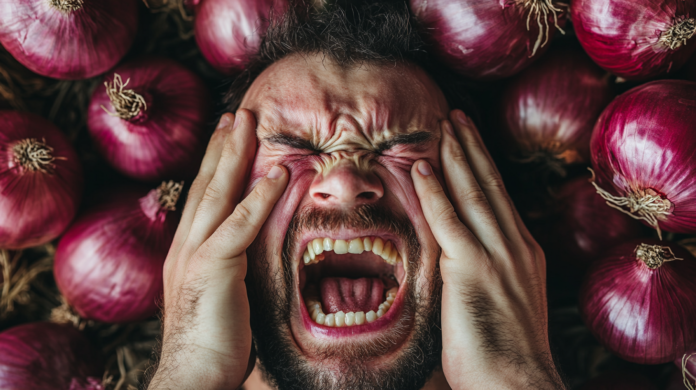Table of Contents
Onions are the culinary world’s secret weapon. They’re versatile, flavorful, and packed with nutrients, making them a staple in kitchens worldwide. But let’s face it—onions also have a dark side. If you’ve ever been brought to tears while chopping them, you’ve probably wondered: why do onions make us cry? Is it some form of vegetable revenge, or is there a more scientific explanation? Dive into this fascinating topic as we unravel the chemical love-hate relationship between humans and onions. Spoiler alert: it’s all about chemistry!
The Science Behind Onion Tears
Let’s start with the basics. When you cut into an onion, you break open its cells. This simple act sets off a chain reaction that’s almost like a mini chemical experiment in your kitchen. Onions contain sulfur compounds, which, when mixed with certain enzymes, create volatile chemicals. These chemicals don’t just linger in the air—they target your eyes. The reaction produces a gas called syn-Propanethial-S-oxide, which wafts up and comes into contact with your eyes, triggering a stinging sensation. In response, your tear glands go into overdrive, trying to flush out the irritant. It’s not you being overly sensitive; it’s pure biochemistry.
Sulfur Compounds: The Hidden Culprits
Why do onions have sulfur compounds in the first place? These sulfuric compounds serve as a natural defense mechanism for the onion. Think of it as the onion’s way of saying, “Don’t mess with me!” When animals or pests nibble on an onion, the release of these compounds makes the experience unpleasant, encouraging them to find a different snack. This evolutionary trick has worked for onions for thousands of years, keeping them relatively safe from predators. However, for us humans, these sulfuric compounds are a double-edged sword: they make us cry, but they also add depth and complexity to the onion’s flavor when cooked.
The Role of Enzymes in the Chain Reaction
When you cut an onion, you’re not just slicing through vegetable layers; you’re activating an entire chemical reaction. The enzyme responsible for this drama is called alliinase. This enzyme reacts with sulfur-containing molecules in the onion to produce sulfenic acid. But it doesn’t stop there. This sulfenic acid is unstable and quickly rearranges itself into syn-Propanethial-S-oxide—the tear-inducing gas that irritates your eyes. What’s fascinating is how this reaction happens almost instantly, proving that onions have evolved a highly efficient chemical defense system.
Why Are Onions So Unique?
Not all vegetables have the power to bring you to tears, so what makes onions so special? The answer lies in their evolutionary history and unique chemical composition. Onions are part of the Allium family, which includes garlic, shallots, and leeks. While other Allium vegetables share some similarities, onions have the highest concentration of sulfur compounds and enzymes that trigger the tear response. This sets them apart, making them both a culinary treasure and a chopping challenge.
How Lachrymatory Factor (LF) Targets Your Eyes
The lachrymatory factor (LF) is the true villain in this story. Once released, LF is highly volatile and spreads through the air quickly. When it reaches your eyes, it reacts with the moisture on your eyeballs to form sulfuric acid. Yes, you read that right—sulfuric acid. This acid irritates the nerve endings in your eyes, sending signals to your brain that result in a reflexive tearing response. Your body is essentially trying to protect your eyes by washing away the irritant. Unfortunately, this reaction can feel more like a punishment than a defense.
Tips to Minimize the Tears
Now that we know why onions make us cry, how can we avoid it? The good news is that there are several kitchen hacks to keep the tears at bay. One popular trick is to chill your onion in the freezer for about 10-15 minutes before cutting it. Cold temperatures slow down the chemical reactions, reducing the release of tear-inducing compounds. Another method is to use a very sharp knife. A sharp blade causes less cell damage, which means fewer enzymes are released to start the chain reaction. You can also try cutting onions under running water or near a fan to disperse the gas before it reaches your eyes.
The Future: Tear-Free Onions
Believe it or not, scientists have been working on creating tear-free onions. These onions are bred to produce fewer sulfur compounds, which means they don’t trigger the lachrymatory factor. While still relatively rare and not widely available, these onions could revolutionize cooking for those who dread the teary-eyed chopping experience. However, some chefs argue that these onions lack the robust flavor profile of traditional onions, so the trade-off might not be worth it for everyone.
Why Onions Are Worth the Tears
Despite their tear-inducing nature, onions are irreplaceable in the kitchen. They’re a foundational ingredient in countless recipes, from soups and stews to stir-fries and salads. Their unique ability to enhance flavors makes them a culinary staple. Beyond their taste, onions are also incredibly nutritious. Packed with vitamins, minerals, and antioxidants, they offer numerous health benefits, including improved immune function, reduced inflammation, and even cancer-fighting properties. When you consider all that onions bring to the table, a few tears seem like a small price to pay.
The Emotional Side of Onions
Onions aren’t just about flavor and nutrition; they’re tied to emotions and memories as well. Think about the comforting aroma of caramelized onions wafting through your home or the nostalgia of your grandma’s onion-laden stew. Onions have a way of connecting us to our past and evoking a sense of warmth and comfort. In literature and art, onions often symbolize complexity and layers, much like human emotions. So, while onions may bring tears to your eyes, they also bring joy to your soul.
Conclusion
Onions are a paradox: they make us cry, yet they bring us joy. Their unique chemistry, culinary significance, and health benefits make them indispensable in our lives. The next time you find yourself tearing up while chopping an onion, remember that those tears are a testament to the onion’s incredible journey from nature’s defense mechanism to your kitchen staple. So, grab your knife, embrace the tears, and celebrate the humble onion for all it offers.
FAQs
- Why do onions make you cry?
Onions release a gas called syn-Propanethial-S-oxide when cut, which irritates the eyes and triggers tears. - Can you completely avoid crying while chopping onions?
While it’s challenging to avoid it entirely, methods like chilling the onion or using a sharp knife can significantly reduce tears. - Do all onions cause tears?
No, sweet onions have lower sulfur content and are less likely to make you cry compared to pungent varieties. - Are tear-free onions available in stores?
Yes, but they are still rare and may not have the same flavor profile as traditional onions. - What health benefits do onions provide?
Onions are rich in antioxidants, vitamins, and minerals, offering benefits like improved immunity and reduced inflammation.








